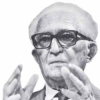Fernand Braudel

Fernand Braudel
Fernand Braudelwas a French historian and a leader of the Annales School. His scholarship focused on three main projects: The Mediterranean, Civilization and Capitalism, and the unfinished Identity of France. His reputation stems in part from his writings, but even more from his success in making the Annales School the most important engine of historical research in France and much of the world after 1950. As the dominant leader of the Annales School of historiography in the 1950s and 1960s,...
NationalityFrench
ProfessionHistorian
Date of Birth24 August 1902
CountryFrance
When discussing the rise and fall of empires, it is well to mark closely their rate of growth, avoiding the temptation to telescope time and discover too early signs of greatness in a state which we know will one day be great, or to predict too early the collapse of an empire which we know will one day cease to be. The life-span of empires cannot be plotted by events, only by careful diagnosis and ausculation--and as in medicine there is always room for error.
For the historian everything begins and ends with time, a mathematical, godlike time, a notion easily mocked, time external to men, 'exogenous,' as economists would say, pushing men, forcing them, and painting their own individual times the same color: it is, indeed, the imperious time of the world.
For a century, the Arabs tribes gave Islam the first of these victories. Then the rough mountain peoples of North Africa, the Berbers, helped it to conquer Spain and organize Fatimid Egypt.
The key problem is to find out why that sector of society of the past, which I would not hesitate to call capitalist, should have lived as if in a bell jar, cut off from the rest; why was it not able to expand and conquer the whole of society?... [Why was it that] a significant rate of capital formation was possible only in certain sectors and not in the whole market economy of the time?
The earth is, like our own skin, fated to carry the scars of ancient wounds.
There are always some areas world history does not reach, zones of silence and undisturbed ignorance.
There were two, three or four French Revolutions. Like a multi-stage rocket today, the Revolution involved several successive explosions and propellant thrusts.
Leadership of a world-economy is an experience of power which may blind the victor to the march of history.
The mere smell of cooking can evoke a whole civilization.
The companies only developed if the state did not intervene in the French fashion. If on the contrary a certain degree of economic freedom was the rule, capitalism moved in firmly and adapted itself to all administrative quirks and difficulties
All history must be mobilized if one would understand the present.
Events are the ephemera of history; they pass across its stage like fireflies, hardly glimpsed before they settle back into darkness and as often as not into oblivion. Every event, however brief, has to be sure a contribution to make, lights up some dark corner or even some wide vista of history. Nor is it only political history which benefits most, for every historical landscape - political, economic, social, even geographical - is illumined by the intermittent flare of the event.
Everything must be recaptured and relocated in the general framework of history, so that despite the difficulties, the fundamental paradoxes and contradictions, we may respect the unity of history which is also the unity of life.
Social science virtually abhors the event. Not without reason; the short-term is the most capricious and deceptive form of time.